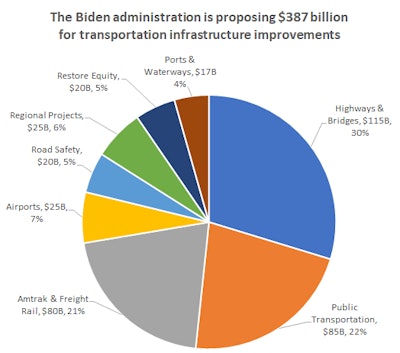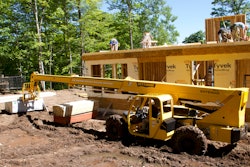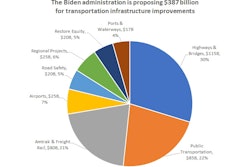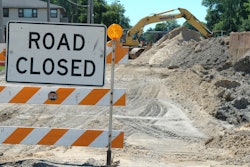
President Joe Biden unveiled the details of his $2 trillion plan to repair and upgrade the country’s infrastructure, calling it “a once-in-a-generation investment in America.”
The American Jobs Plan (AJP) is billed as a way to rebuild the nation’s infrastructure systems while generating employment and economic growth. It includes investment beyond transportation infrastructure such as broadband, school construction and drinking water. Climate change and “racial equity and environmental justice” initiatives are also woven into the funding and policy proposals.
“Is it big? Yes. Is it bold? Yes. But we can get it done,” Biden said during a press event in Pittsburgh. “The heart of the plan is modernizing transportation infrastructure – our roads, bridges and airports. It grows the economy in key ways. It makes it easier and more efficient to move goods, get to work, and become more competitive around the world. It will unlock traffic, reduce the bottlenecks at our ports and airports, keep people safe, and connect our cities, towns, and tribes across the country.”
Biden is proposing $621 billion in total spending for the the transportation sector alone.
Among the proposals: Modernize 20,000 miles of highways and roads; repair 10,000 bridges; and, by 2030, build a network of 500,000 electric vehicle chargers.
The goal: To revitalize the aging or crumbling corridors that get American people and products from place to place, while reducing the sector’s reliance on fossil fuels that drive climate change.
What’s included: ARTBA President and CEO Dave Bauer participated in a White House briefing on details of the plan, which includes:
- $115 billion: modernize roads and bridges with a focus on rebuilding for resilience.
- $85 billion: public transportation and to expand service to under-served areas.
- $80 billion: Amtrak improvements and loan and grant programs to improve freight rail.
- $25 billion: large, complex infrastructure projects of regional significance.
- $25 billion: airports, including terminal improvements and multi-modal connections.
- $20 billion: improve road safety, including state and local ‘Vision Zero’ plans.
- $20 billion: address historic inequitable investment decisions
- $17 billion: ports and inland waterway improvements.
The AJP also proposes significant new programs and policy changes, including:
- Building 500,000 electrical vehicle charging stations.
- Researching advanced pavements and technologies.
- Launching workforce development programs with emphasis on supporting women, people of color and underserved communities.
Pay-fors: The administration’s accompanying Made in America Tax Plan proposes to increase the corporate rate from 21 percent to 28 percent. The administration suggests this would pay for the $2 trillion infrastructure investment over 15 years. Other corporate tax changes including eliminating loopholes, increased enforcement, and modifying deductions would also help pay for the plan.
Bipartisanship Essential for Success
While most Democrats showered praise on Mr. Biden for the expansive package, the critiques from members of both parties illustrated that infrastructure legislation, once seen as a promising area of bipartisan compromise, is unlikely to sail through this Congress with widespread support from both sides. And the success of the plan depends largely on Congress coming to agreements on the details which has been hard to come by as of late.
"The president’s plan will accelerate a long overdue conversation about how to modernize our roads, bridges, public transit and other infrastructure systems. Members of Congress from both parties will rightly have their own policy thoughts," Bauer said in a statement. “The most important thing is not whose plan passes Congress, but that at the end of the process the American people have increased mobility and the competitiveness of the U.S. economy is strengthened.”
Infrastructure has been touted as a bipartisan issue but both parties have their own agendas which do not always align with what is best for the American people.
"It is critical that Congress and the Administration work together in a bipartisan manner to reauthorize the federal surface transportation programs before the end of September," Jim Tymon, AASHTO executive director said. "A long-term and robust reauthorization bill will provide state DOTs the predictability they need to continue to improve the transportation network to provide greater access to opportunities for everyone including employment, education, health services and recreation.”
The American Society of Civil Engineers (ASCE) agrees. ASCE’s 2021 Report Card for America’s Infrastructure found the nation earned a ‘C-’, up from 2017’s cumulative GPA of ‘D+’ and are hopeful a robust package like the one proposed will accelerate these improvements.
"The focus [on the plan] is rightly on tackling the maintenance backlog for our transportation, water, and freight systems, enabling “shovel worthy” ideas to get across the finish line, ensuring new projects result in systems that are more resilient, investing in transmission lines to connect the grid, and reflects that our infrastructure is truly a connected system that is only as strong as its weakest link. The recent tragedy in Texas has brought that concept to the forefront," Jean-Louis Briaud, Ph.D., P.E., president, ASCE said. "As the nation looks to revitalize and jumpstart the economy, ASCE believes that infrastructure investment is the key to long-term recovery and prosperity, as well as providing access and opportunity to communities across the country. We look forward to working with the Administration and Members of Congress on this crucial, bipartisan, issue as the American Jobs Plan continues to develop."
With slim House and Senate majorities that leave little room for defections, Democratic leaders now must begin drafting a large and complicated bill including individual proposals for infrastructure projects and other domestic programs as well as changes to the tax code.
Corporate Tax Increase to 28%
While the industry welcomes the funding increase, experts say using tax increases as a pay-for raises isn't the answer.
“We cannot begin thinking of bills that spend trillions as the new normal,” said Representative Sam Graves of Missouri, the top Republican on the Transportation and Infrastructure Committee. “The president’s blueprint is a multitrillion-dollar partisan shopping list of progressive priorities, all broadly categorized as ‘infrastructure’ and paid for with massive, job-killing tax increases.”
Republicans are already gearing up to fight the plan. Marc Short, a longtime aide to former Vice President Mike Pence, has started a new group, the Coalition to Protect American Workers, that aims to raise $25 million to $50 million from conservative donors to defeat the infrastructure initiative.
The U.S. Chamber of Commerce, which has been vocal in urging the President and Congress to address infrastructure as a first priority after pandemic relief, believes the proposed tax increases and related changes could actually counteract the plan's benefits.
“We need a big and bold program to modernize our nation’s crumbling infrastructure and we applaud the Biden administration for making infrastructure a top priority,” stated Neil Bradley, executive vice president and chief policy officer, U.S. Chamber of Commerce. “However, we believe the proposal is dangerously misguided when it comes to how to pay for infrastructure.
"Properly done, a major investment in infrastructure today is an investment in the future, and like a new home, should be paid for over time – say 30 years – by the users who benefit from the investment," he continued. "We strongly oppose the general tax increases proposed by the administration, which will slow the economic recovery and make the U.S. less competitive globally – the exact opposite of the goals of the infrastructure plan."
The Association of Equipment Manufacturers also expressed concerns over the proposed changes in corporate tax structure, with Kip Eideberg, senior vice president of government and industry relations, stating: “We support President Biden’s vision for how to build a new and stronger economy that creates opportunity for all Americans. Equipment manufacturers are investing in their communities and creating new family-sustaining jobs, encouraged by signs that we may finally be getting COVID-19 under control. We stand ready to work with President Biden to help him make the bold, transformational investment in workforce development, infrastructure, and American manufacturing that is long overdue.
"At the same time, we strongly urge him to make sure that we preserve the predictability and stability in the tax code that keeps equipment manufacturers competitive and drives job creation and good wages," he continued. "Tax reform made equipment manufacturers more competitive in the global economy. It is imperative that we do not undo that progress.”
Asphalt industry veterans agree.
"Corporate tax increases head towards eliminating the Highway Trust Fund which won’t give states the visibility to see the money they are going to have to build long term projects," Stan Bass, chief growth officer at Vulcan Materials says. "If they don't have visibility to those funds, how will they know what projects to invest in?"
Green Initiatives Cause Concern
For Democrats, infrastructure funding means finding ways to combat climate change and build resilient structures using green initiatives.
Biden is putting these green initiatives front-and-center in his infrastructure proposal that calls not only for building roads and bridges, but also for investments in electric vehicle charging stations, zero-emission buses, transit and zero-carbon electricity generation by 2035.
During the National Asphalt Pavement Association virtual annual meeting, experts weighed in on where they think the industry should focus their efforts.
"Democrats are trying to reduce money for highways, forcing people to get out of cars and into public transportation," Bass says. "We need to focus on the highway program. When we talk about infrastructure, we can’t assume people on The Hill know we’re talking about highways. We need to make it known that we need a multi-year surface transportation measure. No matter what other infrastructure is captured in these funding packages, we need to focus on a surface transportation package."
Increased Federal Requirements
While welcoming the multi-trillion investment in U.S. infrastructure, the Associated General Contractors of America (AGC) issued a statement expressing concern over potential federal stipulations that are expected to be part of the plan.
“AGC welcomes sorely-needed public and private construction investment that can generate long-term benefits for our economy, communities and national security,” the association noted in a March 25 statement. “However, AGC remains concerned about the possibility of unpredictable and impracticable federal requirements being attached to those investments that, in turn, could significantly diminish its buying power and create barriers to full and open competition.”
Still, the industry is excited for the positive impacts the potential bill will bring. National Asphalt Pavement Association (NAPA) President and CEO Audrey Copeland, Ph.D., P.E., issued the following statement in response to President Joe Biden’s American Jobs Plan:
“Asphalt pavements are critical to creating world-class roads, highways, and airfields. President Biden’s proposal to renew 20,000 miles of roads will directly benefit from the latest innovative asphalt pavement technologies that are economical, resilient, and environmentally friendly. The 150,000 essential, skilled workers throughout our industry stand ready to modernize these roadways. To secure a sustainable future for America’s vital transportation network, we call upon the administration and Congress to approve predictable, multiyear funding for infrastructure renewal by July 4.”




















